|
|
|
Sort Order |
|
|
|
Items / Page
|
|
|
|
|
|
|
| Srl | Item |
| 1 |
ID:
152107
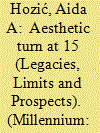

|
|
|
|
|
| Summary/Abstract |
Roland Bleiker’s article ‘The Aesthetic Turn in International Political Theory’ appeared in this journal in December 2001 as part of a special issue on ‘Images, Narratives and Sounds’.1 The article drew a line between mimetic approaches to international relations, which did not ‘pay enough attention to the relationship between the represented and its representation’, and aesthetic approaches, which directly engaged ‘the gap that inevitably opens up between a form of representation and the object it seeks to represent’.2 Arguing that ‘representation is always an act of power
|
|
|
|
|
|
|
|
|
|
|
|
|
|
|
|
| 2 |
ID:
152110
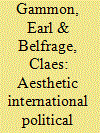

|
|
|
|
|
| Summary/Abstract |
Though aesthetics is commonly understood as the reflection on art, and especially beauty, it is a broader concern, captured by the term’s etymology in the Greek ‘aisthesis’, referring to perception and sense impressions. Aesthetics, though, is not simply a passive process, of how the outer world strikes the mind, but an interactive one, which, through our selective attention, we attenuate the complexities of reality. Aesthetics is about the formation of the objects that constitute our social milieu, those we invest in to give rhythm, order and unity to our lives. Aesthetics is also, vitally, about the formation of the self, about how we constitute ourselves as objects in relation to the world.
|
|
|
|
|
|
|
|
|
|
|
|
|
|
|
|
| 3 |
ID:
152109
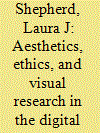

|
|
|
|
|
| Summary/Abstract |
Fifteen years ago, Roland Bleiker’s profound and influential article outlined a research agenda for those who take seriously the nature of aesthetic encounters with the social world. A rich and sophisticated literature addressing theoretical and methodological aspects of visual research in IR has emerged through the ‘aesthetic turn’ in International Relations (IR) theory.1 Efforts to theorise, or represent, global politics that are inspired by an aesthetic approach do not seek to produce the ‘most accurate’ theory or representation. ‘Approaching the study of IR with an aesthetic sensibility encourages scholars to pay analytical attention to affect rather than reason, judgement rather than fact, sensation rather than intellectualism’.
|
|
|
|
|
|
|
|
|
|
|
|
|
|
|
|
| 4 |
ID:
152104
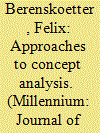

|
|
|
|
|
| Summary/Abstract |
This article takes as its point of departure Stefano Guzzini’s recent call for ‘ontological theorizing’ as a reflexive engagement with central concepts. In an attempt to advance this agenda, the article presents an accessible overview of different approaches to concept analysis to stake out the field for a discussion of what ontological theorising might entail. The article advances the notion of concepts as ‘basic’ and lays out the parameters through which they obtain meaning, followed by a discussion of three approaches, which tackle the multifaceted nature of basic concepts within and across different contexts. These approaches are labelled ‘historical’, ‘scientific’ and ‘political(critical)’ and presented through the work of Reinhart Koselleck, Giovanni Sartori and Michel Foucault, respectively. The article notes that concept analysis, as discussed here, stands in tension with modern forms of theory building yet is a creative source for theorising that accepts the unstable, political and context-bound nature of ontology.
|
|
|
|
|
|
|
|
|
|
|
|
|
|
|
|
| 5 |
ID:
152112
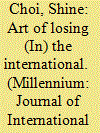

|
|
|
|
|
| Summary/Abstract |
North Korea is an illustrative limit case for exploring contributions of an aesthetic approach to ‘decentering’ IR and taking seriously non-Western subject positions and agencies.1 North Korea is an international problem of human rights, poverty and security that sits across an enemy line, a line where empathy ends and the terrible begins. There are good reasons to condemn, hate and close down our ability to imagine subject positions – the source of life – across this enemy line. Here we can point to its notorious labour reeducation camps and frequent political purges and executions.
|
|
|
|
|
|
|
|
|
|
|
|
|
|
|
|
| 6 |
ID:
152114
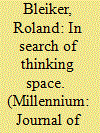

|
|
|
|
|
| Summary/Abstract |
In the 15 years since the Millennium special issue on ‘Images, Narratives and Sounds’ scholarship on aesthetic politics has proliferated.1 Countless inquiries now show how aesthetics is about far more than art: it is about rethinking the fundamental issues that drive global politics. The moment has come to reflect on the contributions of the aesthetic turn and to identify potentials and challenges ahead. I do so by stressing that the key is not agenda-setting, but to continue the search for thinking space: to explore ever new ways of writing, seeing, hearing and sensing the political. I then identify two challenges: first, to push creative work while, at the same time, increasing the ability to speak to a broad audience; and second, to avoid the hubris of overarching explanations and, instead, cultivate pluralism and self-reflexivity. The latter is important to address practices of exclusion, such as those linked to the Western legacy of aesthetic theories.
|
|
|
|
|
|
|
|
|
|
|
|
|
|
|
|
| 7 |
ID:
152106
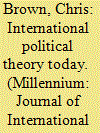

|
|
|
|
|
| Summary/Abstract |
The four books under review offer very different takes on the nature of International Political Theory, but still display certain, cross-cutting, similarities.
|
|
|
|
|
|
|
|
|
|
|
|
|
|
|
|
| 8 |
ID:
152103


|
|
|
|
|
| Summary/Abstract |
Recent breakthroughs in neuroscience have led to increasing concern about its uses in warfare. This article challenges the primacy of dual-use frameworks for posing ethical questions concerning the role of neuroscience in national security. It brings together three fields – critical war studies, bio-ethics, and the history of medicine – to argue that such frameworks too starkly divide ‘good’ and ‘bad’ military uses of neurotechnology, thus focusing on the degradation of human capacities without sufficiently accounting for human enhancement and soldier rehabilitation. It illustrates this through the emergence of diagnoses of Traumatic Brain Injury and Polytrauma in the context of post-9/11 counterinsurgency wars. The article proposes an alternative approach, highlighting the historical co-production and homology of modern war and medicine so as to grapple with how war shapes neuroscience, but also how neuroscience shapes war. The article suggests new routes for thinking through the connections between war, society, science, and technology, proposing that we cease analysis that assumes any fundamental separation between military and civilian life.
|
|
|
|
|
|
|
|
|
|
|
|
|
|
|
|
| 9 |
ID:
152108
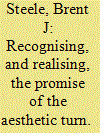

|
|
|
|
|
| Summary/Abstract |
Roland Bleiker’s iconic and courageous mapping of the aesthetic turn in international political theory called attention to one very basic but up until then unstated maxim: that the ‘inevitable difference between the represented and its representation is the very location of politics’.1 Exactly. Thanks to this insight, the aesthetic turn revealed a kind of vulnerability of states – and of great powers in particular – that had not previously been seen. This ‘aesthetic vulnerability’ brought to light states’ concern with their own representation and self-representation, with the way they ‘look’ in their own eyes and in the eyes of others. This soft underbelly of power politics acquired particular urgency after 9/11, as the hyper-visuality of the event – and its violent aftermath – so evidently pointed at that ‘representational gap’. The ‘aesthetic vulnerability’ of the United States called attention to its representational practices and, simultaneously, opened political spaces to challenge its policies. However, as the never-ending ‘War on Terror’ mutates into ‘global Trumpism’, the limits of this near-exclusive focus on the United States and the West are becoming more evident, demanding consultation of new perspectives and new terrains for ‘aesthetic’ engagements in, and of, critical IR.
|
|
|
|
|
|
|
|
|
|
|
|
|
|
|
|
| 10 |
ID:
152111
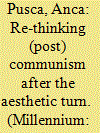

|
|
|
|
|
| Summary/Abstract |
The relationship between art and politics was in many ways uniquely important in communist spaces, where the totalising experience of the communist state and ideology needed to be built quickly and emerge in a way that would completely control the visibility of ‘change’. Not unlike the post-communist transition experience, the communist experience was also dominated by an ethos of aggressive social change and progress. Measuring both change and progress was instrumental to the communist state, and art – especially propaganda art – played an essential role in instigating, legitimising and rendering change visible. From posters, to public statues, to rising industrial platforms and communist blocs, to new avenues and massive public infrastructure projects, the ‘artist’ – whether an architect, painter, plastic artist, performer or poet – was an essential ‘tool’ in the ideological arsenal of the communist state. It is thus not surprising that any serious study of politics in the post-communist context needs to take the question of ‘art’ and ‘aesthetics’ seriously.
|
|
|
|
|
|
|
|
|
|
|
|
|
|
|
|
| 11 |
ID:
152105
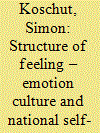

|
|
|
|
|
| Summary/Abstract |
Why do individuals sacrifice themselves to defend a nation-state? This article emphasises the link between emotion and culture by investigating the affective reproduction of culture in world politics. Building on the tradition of Émile Durkheim, it introduces the concept of emotion culture to IR. Emotion cultures are understood as the culture-specific complex of emotion vocabularies, feeling rules, and beliefs about emotions and their appropriate expression that facilitates the cultural construction of political communities, such as the nation-state. It is argued that emotions provide a socio-psychological mechanism by which culture moves individuals to defend a nation-state, especially in times of war. By emotionally investing in the cultural structure of a nation-state, the individual aligns him/herself with a powerful cultural script, which then dominates over other available scripts. The argument is empirically illustrated by the case of the so-called Japanese kamikaze pilots.
|
|
|
|
|
|
|
|
|
|
|
|
|
|
|
|
| 12 |
ID:
152113
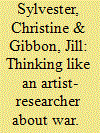

|
|
|
|
|
| Summary/Abstract |
A series of sketchbooks appear in Figure 1. They have been drawn in arms fairs in London and Paris. The halls are crowded – a sea of men and occasional women in pinstriped suits. On show is a huge array of military equipment and security services. Teargas canisters are arranged in glass cabinets, missiles glint under spotlights, guns are lined up to try out against painted targets, tank barrels are raised. There are also body parts, not the casualties of war – they are nowhere to be seen – but displays of gloves, boots, and gasmasks. Here, military equipment ‘steps forth as a commodity, it is changed into something transcendent.’
|
|
|
|
|
|
|
|
|
|
|
|
|
|
|
|
|
|
|
|
|